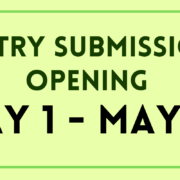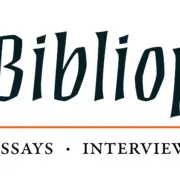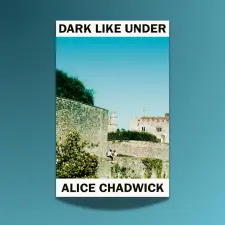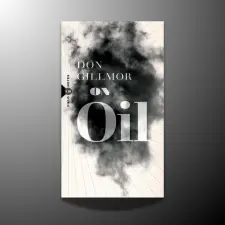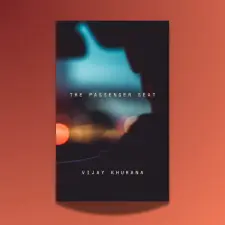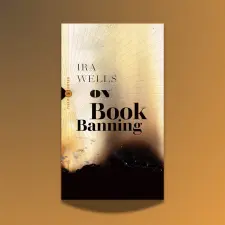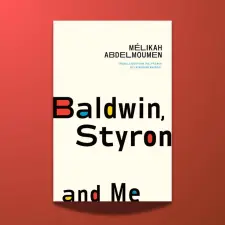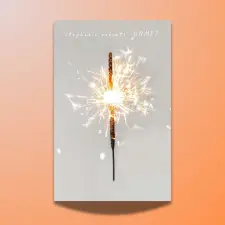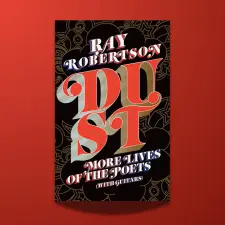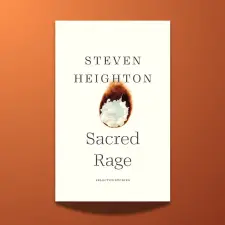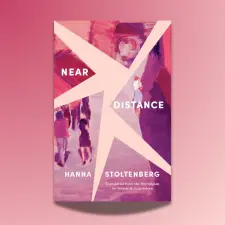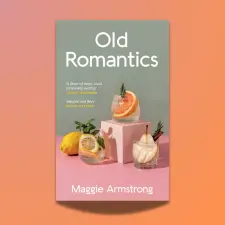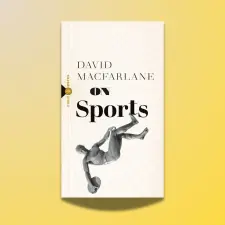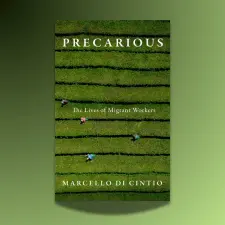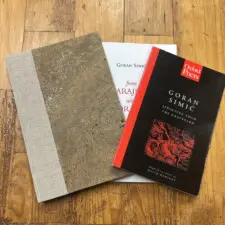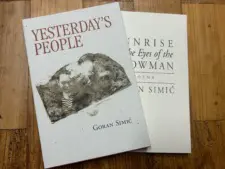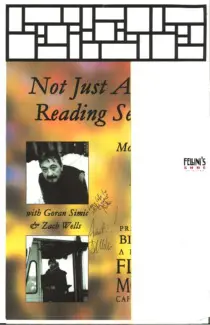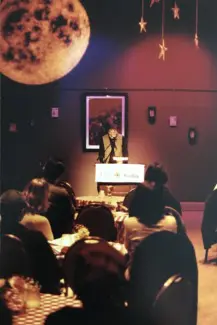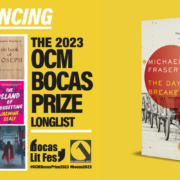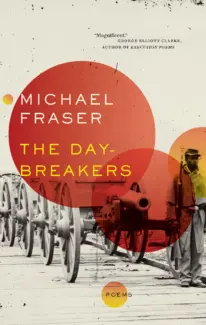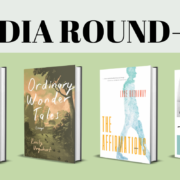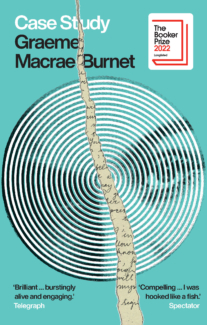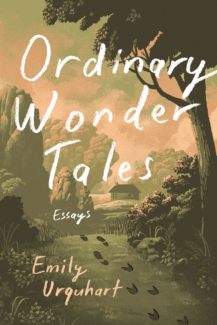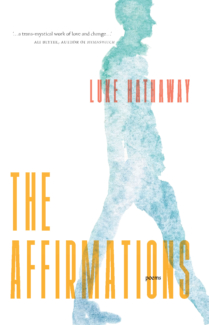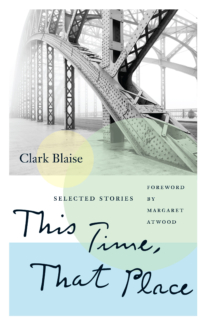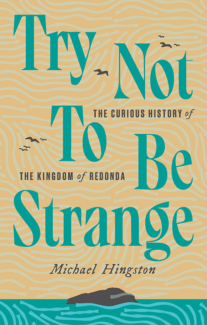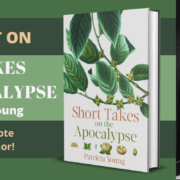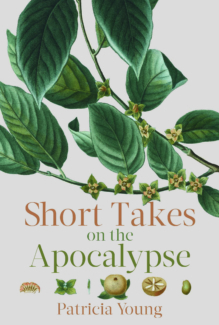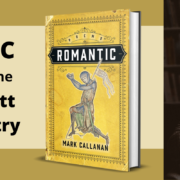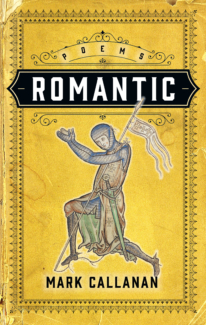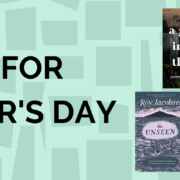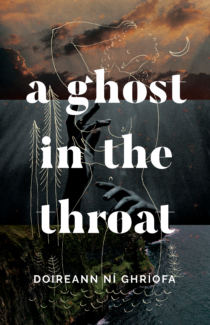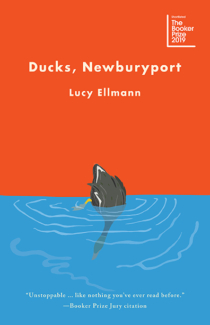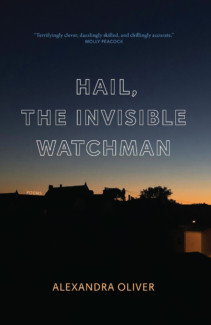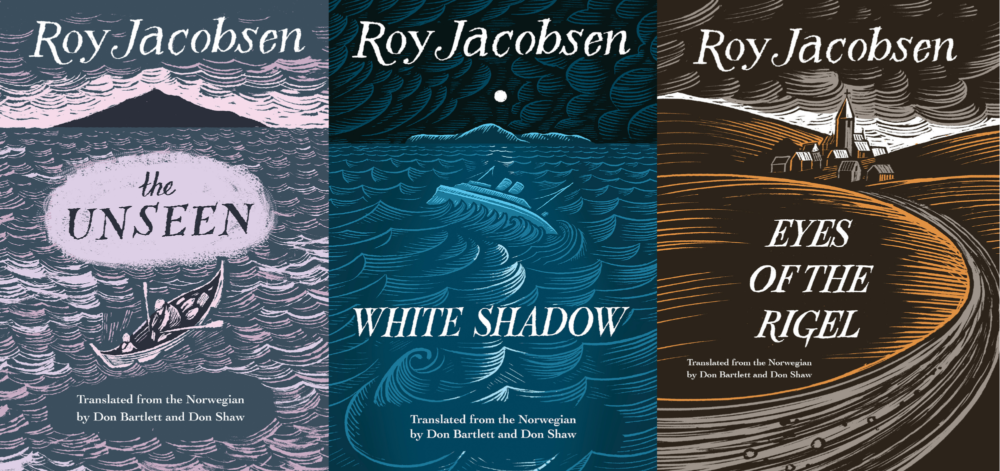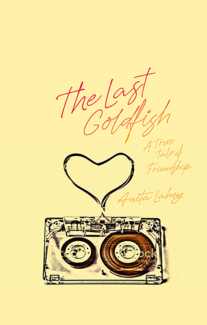Want to get new excerpts, musings, and more from The Bibliophile right away? Sign up for our weekly online newsletter here!
***
Introducing Best Canadian Poetry 2025
It’s been a few years since it fell to me to send the acceptances for the three Best Canadian anthologies: Ashley Van Elswyk, our editorial assistant, has lately managed this massive and potentially unwieldy task with her usual good humour and organizational grace. But as I recall, the poets’ responses tended to be the most entertaining. These ranged from effusive thanks directed to the messenger, who truly deserved none—all credit to series editor Anita Lahey and our guest editors, who annually make the selections, buoyed by seemingly bottomless stores of enthusiasm and curiosity—to what amounted to gentle phishing accusations, so surprised are some writers to learn they’ve made the year’s list. I have certainly felt the same way on the receiving end of one of those magical emails dispatched from the mysterious island of editors: Who are you, really, and why are you subjecting me to such a cruel joke? Writing is failure, as a wise soul reminds us, but every now and then—annually, for at least fifty Canadian poets—maybe it isn’t, and readers of Best Canadian Poetry are the rich recipients of these successes.
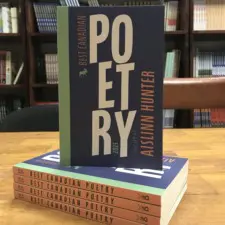
Photo: A stack of the new Best Canadian Poetry 2025 selected by Aislinn Hunter, with longtime series editor Anita Lahey.
Occasionally a writer would ask me what it was we meant by “best,” or by “Canadian,” though I can’t remember a poet asking what we meant by “poetry.” I doubt this is because we each have an answer ready. It’s far more likely that we are glancing sideways at each other and hoping not to be asked, either because we haven’t a clue at the moment, or because we know precisely and with a fierce certainty we’d either be embarrassed to assert or afraid to argue for and fail to defend. On my brighter days I believe and happily insist that what poetry is is an attempt to understand what poetry is, and on my darker ones I lament the same. On my pedantic days, of which one is Friday, November 22, I am partial to the offerings of William Carlos Williams—“A poem is a small (or large) machine made of words”—and Robert Frost: “a momentary stay against confusion.” I like the Williams for the veneer of exactitude it undercuts at the same time it declares itself, how its metaphor invites extending. Small like a pencil sharpener, or like a really big humidifier? Large like Linotype, or like a particle accelerator? Yes, and yes, and yes and yes. Frost, of course, is Frostier: as the key turns in the sonnet’s lock, for at least that instant, something has tumbled into place.
Inevitably our BCP editors must face this question and its endless answers again and again as they compile their initial list of one hundred poems and meet over a period of months to discuss and refine that selection to just fifty. I don’t envy them their task—every poem, and every acknowledged answer, means another crossed off the list—yet those decisions yield yet another entryway, another place to stand. Having completed her selection for BCP25, Aislinn Hunter, this year’s guest editor, writes in her introduction:
I believe that poems behave like living things. They open and close, they shift and grow. Poetry’s essential elements move into us—letter and word shapes swimming past retinal neurons and along phonological and lexical routes, eventually meeting neurons and synapses that light up the forest / the temple / the mess hall of our brains. Language—poetry’s essence—changes our physiology, which is to say that a poem’s doing to us is as real as rain on skin. Of course, the power of the art we’re meeting matters, as does the state of alertness we’re in.
In our disembodied age, in which we are increasingly more likely to encounter one another as pixels than as people, what a beautifully embodied understanding of the ways that poems can do their work on us, can remind us how to slow and even stop, if only for a momentary stay.
And so, Dear Reader, I leave you with three of my favourites from this year’s edition: Molly Peacock’s “Honey Crisp,” Bertrand Bickersteth’s “A Poem about Black Boy’s Horse,” and “He/him” by Y.S. Lee. Each is accompanied by the poet’s biography and their comments on the making of the poem, a favourite feature among BCP readers old and new. I hope they’ll find you, wherever you are, and leave you feeling a little bit more real, open to yourself and to the world we share.
p.s. Books, I’m told, make great holiday gifts, especially ones that come price-bundled and beautifully wrapped in Ingrid Paulson’s superb Best Canadian Series design.
Vanessa Stauffer,
Managing Editor
***
Honey Crisp
Molly Peacock
Hello wizenface, hello apple,
understudy in the fridge
since March (it’s September).
Hello wrinkly red cheeks,
I’ll bet you’re almost a year old,
born last autumn,
kept in the fruit storage built
half-underground on the farm,
then, in the snow, sold to me.
Hello my honey crisp (well,
my honey, no longer crisp . . .),
are you asking why you
haven’t been eaten by now?
Because that man hewed to his routines:
an apple for lunch every day,
the same red punctuation.
You were earmarked for the date
he slipped from my arms & we both
slid to the floor, red angel, are you
listening? 911, hospital, hospice,
and ten days later (you were
about six months old then),
he died and was carried
to a cold shelf.
Hello smiley-stem, hello days
moving you from spot to spot.
Hello week where I forgot
and left you at the back and
went about my new life.
Greetings new groceries!
Their jumble causes a re-
arrangement of your bin,
so I have to pick you up
—would you rather
have been eaten and
lived on as energy?
Not yet, not yet, my pomme.
Hello soft wrinkled
face in my palms.
—from The Walrus
Molly Peacock lives in Toronto and has published eight books of poems, including The Widow’s Crayon Box (W. W. Norton, 2024). She inaugurated The Best Canadian Poetry series in 2008 with Tightrope Books, editing it until 2017, and is delighted to return as a contributor. Peacock is also the author of two biographies of women artists, The Paper Garden (Emblem Editions, 2011) and Flower Diary (ECW Press, 2021), and the memoir Paradise, Piece by Piece (Riverhead, 1998).
Of “Honey Crisp,” Peacock writes, “After my husband died, I cried for twenty-eight days straight. On the twenty-ninth day, I woke without tears, picked up a blue mechanical pencil, and began to write the poems that would become The Widow’s Crayon Box. ‘Honey Crisp’ literally began when I walked to the refrigerator. There was my husband’s last apple—I couldn’t throw it out. In the back of my mind was William Blake, who spoke to a Tyger. Could I write a poem where I spoke to the apple, telling it what happened to my husband, reminding it of its origins, how I bought it, and why it would never be eaten? That idea could go very, very wrong! But widowhood made me fearless. I pulled out a purple pad (what other colour do widows use?) and drafted the poem. It amazed me that if I was simple and direct, like a seventeenth-century poet talking to an animal, I could infuse the poem with all I felt. P.S. The apple stayed in the fridge after the poem. I painted a watercolour of it. Then put it back. A long time after that, I buried the almost-dried apple with the geraniums in my balcony garden.”
***
A Poem about Blackboy’s Horse
Bertrand Bickersteth
Boy’s horse stepped in a badger’s hole, lost her footing
and fell. Boy was flipped
in the air. His foot caught in the stirrup. He felt a pain
shoot through his ankle,
felt the inertia of his flight take over the topography, twist
westerly, still tilting to the east.
His body was a loose spigot pivoting around the fulcrum
of a meaningless ankle.
He felt his fingers slipping through her withers, felt the fear
of the horse rushing to the ground
above him. He couldn’t stop any of it. Couldn’t stop himself
from imagining the unknowable
impact or the whistle of weight to follow. He knew what was
coming. He knew the soil
he was headed for. Knew its knowledge. The chemistry of
its creativity: mildly gleysolic
chernozem, churning life and his livelihood as he knew it.
Knew it, too, as foreign, as far
from familiar as he was from family. He tried to imagine a family
but their image burst into the falling
air before him, before fading, as always, into the darkness
of dirt. Then came the weight
of sadness and the piercing pain of the forgone, unmentioned,
unmurmured, like that flash of green,
that patch of wild timothy whose individual blades know nothing
of their shared past,
know nothing of their sibling entanglement, nothing at all
of their intertwined roots
whose domain is the catacombs beneath the crust, whose action
is downward groping, like fingers of ancestry,
a blind quest in the sorrow of soil, forever fumbling, forever finicking
for the unknowable mother of darkness.
—from The Fiddlehead
Bertrand Bickersteth lives in Moh’kins’tsis (Calgary) in Treaty Seven. He is the author of The Response of Weeds (NeWest Press, 2020), which was the recipient of multiple awards, including the Gerald Lampert Memorial Award and the Stephan G. Stephansson Award for Poetry. He currently teaches at Olds College and is writing a collection of poems on Black cowboys.
Of “A Poem about Blackboy’s Horse,” Bickersteth writes, “After suffering from a year-long bout of writer’s block—brought on by the murder of George Floyd in the summer of 2020—I eventually found my way back to writing through the topic of Black cowboys. I was struck by how iconic cowboys are to the west and yet how unknown the existence of Black cowboys is (yes, Black cowboys here in Canada). I began writing a series of poems fleshing out their histories and, for some reason, I became obsessed with the moment of death in one of their lives. John Ware, the most famous/unknown cowboy in Canada, died tragically, ironically, when his horse tripped and fell on top of him. I was compelled to write poems that repeated this moment from different vantages. I think knowing that our national awareness of Black cowboys was doomed to die, I wanted to hold on to him as long as I could, stubbornly pause everything in the moment before the end, desperately cling to that moment when his Black life still mattered.”
***
He / him
Y. S. Lee
At seventeen, you almost crashed the Firebird
on a road whose name we’ve long forgotten.
Flare of yellow in the headlights, then
you stood on the spongy brakes,
wrenched the wheel hard right. We lurched
into stillness, just shy of the ditch
In the minute afterward
engine ticking
cicadas silenced
you asked, Does life feel real to you now?
I think I laughed. I definitely thought
No
When you tell me your big news
it’s like that moment when the optometrist
flicks one final lever and the soggy letters
suddenly surface, bold and sleek
against a field of light. Oh,
there you are.
—from Grain
Y. S. Lee lives in Kingston, Ontario. She is the author of a poetry chapbook, Exit Permit (Anstruther Press, 2023), and a winner of Contemporary Verse 2’s Foster Poetry Prize. Her fiction includes the award-winning YA mystery series The Agency (Candlewick Press) and a forthcoming picture book, Mrs. Nobody (Groundwood Books).
Lee writes, “I wrote ‘He/him’ for my high-school bestie when he came out as a trans man. I was thrilled for him and wanted to celebrate his identity. Gender transition is sometimes seen as slow and arduous, but I also want to keep sight of what a triumph it is. Plus, he and I did our share of impulsive stuff as teens and I’m interested in how even dumbass near-disasters can offer moments of insight, if we pay attention.”
***
20 Stores for 20 Years: Interabang
The second independent bookstore we’re celebrating as part of our “20 stores for 20 years” anniversary project is Interabang Books, located in Dallas, Texas. Lori Feathers, bookseller extraordinaire, chose the genre bending memoir A Ghost in the Throat by Doireann Ní Ghríofa as her favorite Biblioasis pick, and our publisher Dan shared why he knew Lori would be an amazing advocate for our books from their first meeting.

Photo: The eye-catching front entrance of Interabang Books invites all to come in and browse for their next read.
Dan first met Lori at the 2019 Winter Institute where she quickly became a vocal champion for Lucy Ellmann’s Ducks, Newburyport—and went on to champion many more of our books. Dan says, “I’ve met few other people as committed to the vocation of bookselling, and to independent publishing and literature in translation, as Lori. She’s fearless as a bookseller and literary critic; and as a champion of exceptional books, her enthusiasm and commitment knows no bounds and has resulted in some of my favourite literary things, including her podcast (with Sam Jordison) Across the Pond and her North American edition of The Republic of Consciousness Prize. I wasn’t surprised to learn that she’s also a dancer: she’s as nimble and elegant as they come.”
And here’s why Lori chose A Ghost in the Throat as her favorite Biblioasis book: “More than almost any other book that I’ve read in the past few years, Doireann Ní Ghríofa’s beautifully bewitching A Ghost in the Throat has stayed with me. In it a young, stay-at-home mother becomes obsessed with another woman, long deceased. Her muse is Eibhlín Dubh who, as a young mother herself, composed a legendary, 18th-century lament for her murdered husband, The Keen for Art O’Laoghaire. Although centuries and social class separate the two women, the narrator is irresistibly drawn to Dubh’s Keen. Ghost depicts the narrator’s quest to uncover the essence of Eibhlín Dubh from a history in which she has been silenced. This extraordinary book reclaims Dubh for posterity, reanimating her via Ní Ghríofa’s extraordinary and resonant writing.”
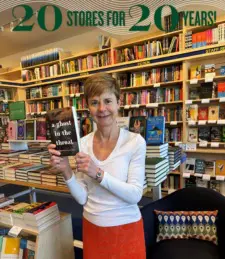
Photo: Lori Feathers posing with her Biblioasis pick, A Ghost in the Throat by Doireann Ní Ghríofa.
***
In good publicity news:

